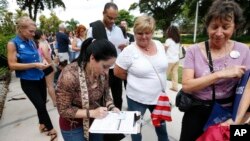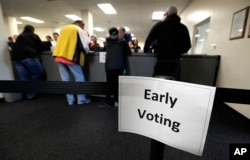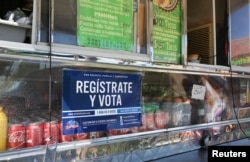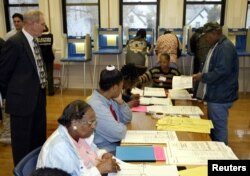For weeks, Republican presidential nominee Donald Trump has been telling supporters that voter fraud could undermine the November 8 election and cause him to lose to Democrat Hillary Clinton.
"They even want to try to rig the election at polling booths where so many cities are corrupt and voter fraud is all too common," Trump has said.
His campaign cites a 2012 study by the Pew Charitable Trusts that looked at national voter rolls. The study found that nearly 2 million deceased people were still registered.
Pew blamed outdated voter rolls, however, and the report found that no ballots had been cast illegally.
There are more than 8,000 voting precincts spread across the United States, and each one has local elected officials who are required to regularly update their communities' rolls.
Dead people 'still voting'
Trump recently told supporters in Green Bay, Wisconsin, that "people who have died 10 years ago are still voting."
Researchers say voter fraud involving ballots cast on behalf of deceased voters is rare, according to FactCheck.org.
"This issue of dead people voting is just not substantiated," Lorraine Minnite, a professor at Rutgers University and author of The Myth of Voter Fraud, said in the FactCheck report.
Josh Douglas, a professor at the University of Kentucky College of Law specializing in election law and voting rights, said impersonating anyone, dead or alive, on the voting rolls is not only a federal crime but also hard to do.
"You'd have to go find someone who has died, find that they're still on the voter registration rolls, and go show up at the polls," Douglas said. "In states that don't have a strict voter ID requirement, you still show some sort of verification. ... Everywhere you need to show something or sign in, and your signature can be matched with the [one] you provided when you registered to vote.
"When I go to my precinct, I have to sign in to vote before I go to the machine. ... So, you'd need to have a mind-boggling ability to predict who hasn't shown up, whom you can sign for that's not going to come later in the day, [and] the ability to match your signature perfectly," he added.
Justin Levitt, deputy assistant attorney general in the Civil Rights Division of the U.S. Department of Justice, authored a 2007 study by the New York University School of Law that stated, "There have been a handful of substantiated cases of individual ineligible voters attempting to defraud the election system. But by any measure, voter fraud is extraordinarily rare."
In 2014, a study, also authored by Levitt, found just 31 instances of voter fraud — out of nearly 1 billion ballots cast — between 2000 and 2014, CNET reported.
Campaign to root out fraud
The New York Times noted that an aggressive campaign against voter fraud by the administration of President George W. Bush brought 120 cases, with 86 convictions, out of 200 million votes cast.
After the study, Pew worked with several states to clean up voter registration rolls, which are affected each time people move, change their name or die.
The Electronic Registration Information Center was created and is used by 21 states and the District of Columbia, CNET reported. The system compares and analyzes data from the 22 entities regarding voter and motor vehicle registrations, U.S. Postal Service addresses and Social Security death records.
"People expect the government is going to be more efficient than it is," David Becker, who helped lead the Pew study and is now executive director of the Center for Election Innovation and Research, told CNET. "They don't realize they have to tell many different state and federal agencies about something like a move."
Trump also alleges at his campaign rallies that illegal immigrants are voting enough to swing the outcome of an election.
Registered to vote
Douglas said that only U.S. citizens can legally register to vote and that any names of noncitizens on the registry would most likely be few, and placed there by error.
"There's some suggestion that there may be some illegal immigrants on voter roles in some states — usually by mistake — and they don't even know they're there," he said. "Typically, [it might occur] when they are interacting with a government agency for something, and as part of that they automatically get registered to vote. There's [virtually no] evidence that these people, even if they are on the rolls, show up to vote.
"There's zero evidence that illegal immigrants are nefariously trying to infiltrate the U.S. election system by covertly registering and then going to vote," Douglas said.
He also said that because of the signature requirement, it also was not likely that a person could vote multiple times. What's more, he said, there are other safeguards. Someone trying to commit voter fraud would most likely be spotted by poll workers, who stay at the polling place all day.Trained political party officials and pro-voting groups also monitor the process.
Douglas said fraud could theoretically affect small local elections, where fewer voters are involved. It could include dishonest poll workers or the purchase or theft of absentee and mail-in ballots.
But he said there's no evidence of fraud on a large scale that could throw a state or national election.
Poll monitors
Trump has also called upon supporters to monitor polling places and be vigilant for voter fraud in areas such as in some inner cities. The statement raises the specter of voter intimidation at polling sites.
Most states make provisions for citizen observers, though they have to be credentialed ahead of the voting. They must also not interfere in the casting of any ballots or try to intimidate voters.
Douglas said voters who suspect fraud or have problems casting their ballots will have access to voter protection teams and lawyers at the voting sites.
Many state officials who oversee elections, including secretaries of state and governors, have come forward to say there will be no rigging. Thirty-one of 50 U.S. states are led by Republicans, including the swing states of North Carolina, Ohio, Wisconsin and Florida.






























